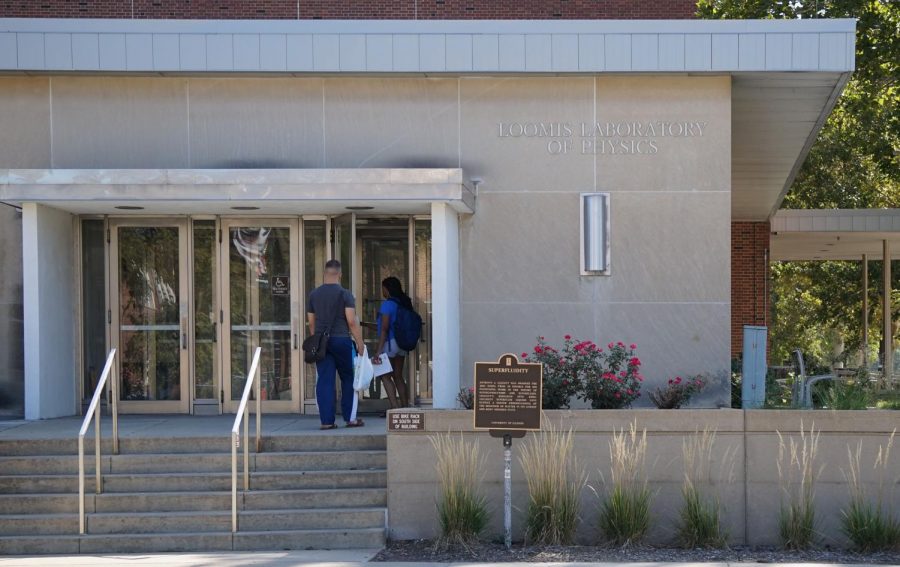University joins $25 million software institute to promote discoveries
People enter Loomis Laboratory of Physics at 1110 W. Green St, where the Department of Physics is located, on Wednesday. Students will have chances to participate in the research and innovation activities through the Institute for Research and Innovation in Software for High-Energy Physics. Data from the research will also boost physics discoveries when the High-Luminosity Large Hadron Collider starts operating in 2026.
Sep 6, 2018
The University is part of the Institute for Research and Innovation in Software for High-Energy Physics. This new $25 million software-focused institute was announced by the National Science Foundation on Tuesday.
Physics professor Mark Neubauer, along with a faculty affiliate with the National Center for Supercomputing Applications, will be part of the institute.
According to the NSF website, the IRIS-HEP will help tackle the unprecedented torrent of data from the High-Luminosity Large Hadron Collider, the world’s most powerful particle accelerator, and help scientists in research of high-energy physics.
“The HL-LHC is a major international particle physics experiment, with thousands of physicists collaborating to upgrade the LHC accelerator and the detectors to be able to create an unprecedented environment of high-rate proton-proton collisions and collect the data stably and efficiently,” Neubauer said in an email.
Neubauer said when the HL-LHC begins operating in 2026, there will be an exabyte of science generated annually by the experiments. Physicists will use all of this data to boost their chances of discovering rare new phenomena about the Higgs boson, he said.
Get The Daily Illini in your inbox!
Neubauer led the conceptualization of the institute and is also a key member of the group that developed the IRIS-HEP proposal.
The money dedicated to the accelerator and detector upgrades is beyond the funding for IRIS-HEP, he said, and there is a tenfold projected shortfall of computing and storage resources needed to analyze huge HL-LHC datasets — a problem that can’t be solved by gains from hardware technology evolution or computing resources alone.
The software is complex and funding will go to support the research and innovation in the software, as well as other important activities that establish IRIS-HEP as an intellectual hub for software development for the international high-energy physics community. These will include outreach, fellowship, training, mentoring and professional development of the next generation of scientists.
Both graduate and undergraduate students will participate in the software research and innovation activities of the institute, in close collaboration with the post-doctorates, research software engineers and senior personnel from multiple disciplines such as physics and computer science.
“The students will develop skills and professional contacts in sustainable software development, data science, machine learning and the analysis of ‘big data’ from the largest international science project in existence,” Neubauer said. “If discoveries are made at the HL-LHC, they will have been part of something revolutionary in terms of our fundamental understanding of nature.”






